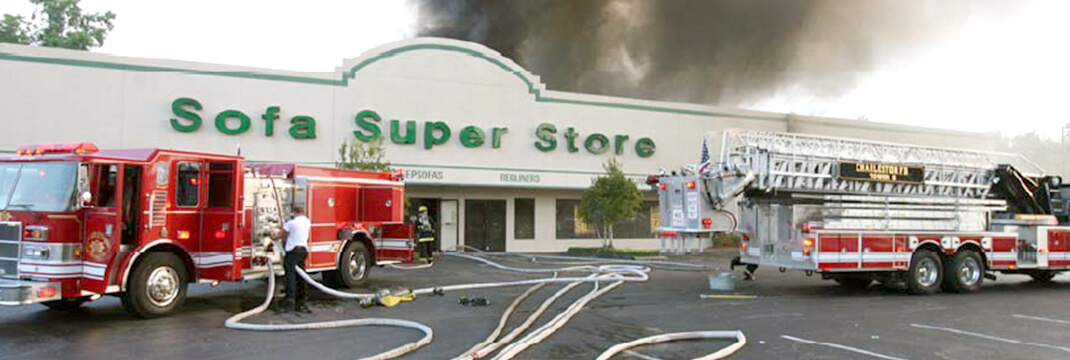
Charleston Sofa Super Store Case
On June the 18th, 2007, a fire broke out in the Charleston Sofa Super Store. The incident claimed the lives of nine firefighters. After a thorough investigation and the course of events of the incident were restored, the research team arrived at the conclusion that weak leadership and management of the Charleston Fire Department have led to the duty deaths of nine firemen. Post-incident assessment and review team had shed some light on the events preceding the incident and that of the incident itself. The research was conducted to find out what exactly has led to the deaths of firefighters in the line of their duty. More importantly, the conducted research gave some insight into how cases like that could possibly be prevented in the future. After a thorough investigation of the Charleston Sofa Super Store fire case, the post-incident assessment and review team arrived at the conclusion that the death of nine firemen was caused by the weak leadership and improper management of the Charleston fire department.
Post-incident assessment and review team’s report arrived at a conclusion that in the line of their duty, the firefighters experienced a set of technical problems and technical problems were the following; the crew was not trained good enough to operate radio communication system and self-contained breathing apparatus (Baker, 2009). Furthermore, it has been reported that “the entire operation was being conducted on a single radio channel” (Baker, 2009). As of 2007, the Charleston Fire Department did not establish an effective incident command structure (Backer, 2009). The equipment the Charleston fire brigade had in their disposal at that time was not sufficient to control the fire, not to mention extinguishing it (Backer, 2009). The deaths of nine firefighters were caused by improper building and property care. Specifically, the preventive firefighting regulations were poorly observed, as the sprinkler system was not installed, proper emergency exits were not maintained, and flammable substances were improperly stored (Backer, 2009). Apparently, the fault for the firefighters’ deaths was not entirely due to poor management and leadership of the Charleston Fire Department. The owners and the staff of the Charleston Sofa Super Store can be blamed for the incident as well.
Building on what the post-incident assessment and review team found out in the course of their investigation, the following recommendations were given. Apparatus staffing was claimed as a top priority (Routley et al., 2007, p. 20). Particularly, the Charleston Fire Department was obliged “to increase overall staffing by approximately 15 percent” (Routley et al., 2007, p. 20). In addition to that, the post-incident assessment and review team put forward a claim that the Charleston fire department should have maintained “an interim minimum staffing level of three crew members on-duty at all times” (Routley et al., 2007, p. 20). Apart from that, the post-incident assessment and review team insisted on Charleston Fire Department’s maintaining the interim minimum staffing levels by continuing to use overtime and compensatory time (Routley et al., 2007, p. 20). Lastly, the Post Incident Assessment and Review Team ordered that the Charleston Fire Department addressed all the given recommendations immediately (Routley et al., 2007, p. 20). The authorities expected full implementation of the recommendations by the year 2009 (Routley et al., 2007, p. 20). Some of the additional recommendations were the following: obtaining and using computer software to monitor individual assignments; reviewing the city’s wages, namely the payment for compensatory and overall time; establishing a reasonable benefits package and a fair system of bonuses and compensations; promoting inclusive empowering management (Routley et al., 2007). The recommendations, given by the post-incident assessment and review team, can be classified as by all means reasonable. When implemented, those recommendations might help to improve the Charleston Fire Department preparedness for emergencies and contingency response.
It is a rather sad thing to admit that the deaths of people could have been avoided if, in the first place, the issues of management and leadership were taken more seriously in the Charleston Fire Department. In the sections that follow the role of effective management and appropriate leadership in fire and emergency services are being contemplated.
Leadership and Management: A General Overview. Determining Their Role for Fire and Emergency Services
Leadership and management have proved themselves to be the essential aspects determining the qualities (key parameters) of the workplace environments. The importance of leadership and management strategies in the daily operations of public services is self-explanatory. Particularly, the role of leadership and management strategies at the emergency scenes can be viewed as one of the preconditions of dealing with emergency situation effectively and appropriately. Organizational challenges hinder proper management of emergency situations in the first place. Most importantly, organizational challenges affect the efficiency of work of the emergency services. As science and technology are continuing to develop at a rapid pace, fire and emergency situations tend to become more complicated, as well as economic and social implications fire and emergency situations are typically associated with. Social and economic implications of fire and emergency management are predominantly associated with the downturn in national and global economies.
The resources are essential for some basic government services that were constrained because of the decline of economies. Under the impact of the inflation processes, wages and fringe benefits in fire and emergency services departments have escalated. More and more volunteer departments are closed as more people decide to take on two jobs to have their requirements met. Persons’ career choices are mainly affected by the change of lifestyle. But, more importantly, people experience significant financial pressure, which affects their involvement in community services and their social life, in general, in the first place. It has been reported that “the public and the media have become more aggressive in demanding to know why and how adverse outcomes and failures occur in public safety organizations” (Berman, Bowman, West, & Wart, 2015, p. 188). Fire and emergency services are experiencing tough times these days. In this respect, it is important to admit that leadership and management may very well be capable of determining the fire and emergency services’ prospects for the future.
Jurisdiction, Agency, Organization, and the Respective Executive Types
Jurisdiction is a term commonly referred to denote a local subdivision of either political or governmental organization(s). The attribute “local” in the given definition of jurisdiction means that the definition itself applies, among others, to the following administrative units: cities, boroughs, counties, towns, hamlets, villages, authorities, subdistricts, and districts (Thiel & Jennings, 2012, p. 189). Jurisdiction executive, as a rule, is a term that denotes a person who takes a position “at the highest organizational level of a jurisdiction” (Thiel & Jennings, 2012, p. 189). Jurisdiction executive can be both, an appointed and an elected position, which depends solely on the form of government. Jurisdiction executive refers to the following public figures: mayor, city administrator, county executive, county management, board chair, and commission chair (Thiel & Jennings, 2012, p. 189). The principal difference between jurisdiction and an organization/agency consists of a fact that organization/agency is an institution “that provides direct service to the customer” (Thiel & Jennings, 2012, p. 189). The concept of organization/agency applies to authorities, departments, and districts (Thiel & Jennings, 2012, p. 189). Evidently, both the organization and agency are synonymic terms. Organization/agency executive is a notion that applies to a “person at the highest level of the organization” (Thiel & Jennings, 2012, p. 189). Administrator, chief engineer, director, and fire chief are counted among the positions that fall under the category of organization/agency executive (Thiel & Jennings, 2012, p. 189). The organization executive has a right to serve as a jurisdiction manager (Thiel & Jennings, 2012, p. 189). Organization/agency manager, in particular, “describes a person in a primarily managerial role within an organization” (Thiel & Jennings, 2012, p. 189). Assistant fire marshal, fire marshal, chief officer, company officer (captain, lieutenant, sergeant, etc.), medical services officer, supervisor, and manager can be viewed as the examples of job titles that fall under the category “organization/agency manager” (Thiel & Jennings, 2012, p. 189). Being an organizational manager presupposes that a person possesses some specific leadership qualities that ensure a person’s effective work.
Describing the Work of Management in Organizations and Its Contemplation through the Lens of the Fire and Emergency Services
To begin with, it should be noted that formal and informal leaders play an important role at each of the organization’s levels. As far as the management of fire and emergency services is concerned, it has to be specified that some specific leadership and management qualities are needed to ensure that the officer corps of organizations of that kind are capable of responding to the emergencies adequately and properly and, thus, handling the emergencies effectively. There is not a small number of cases that conclusively prove that no matter what rank a person holds, they should exercise both leadership and management skills. The modern practices of managing an organization adhere to Fayol’s 14 principles of management. Fayol’s model has proved itself to be effective, time-tested, and thus, widely accepted. Fayol introduces a string of concepts that turn out to be the factors of primary importance in the decision-making strategies of all those who are involved in the management of fire and emergency situations. Apart from that, the researcher stresses the importance of discipline and command. Developing that particular statement further, the author points out that the concept of discipline and command “are familiar in the fire and emergency services but perhaps less accepted elsewhere” (Thiel & Jennings, 2012, p. 190). Other concepts that Fayol pays close attention to are specifically the following; division of work allows people who are involved with the fire and emergency services to increase their competence and, by so doing, to manage the emergencies more effectively (Thiel & Jennings, 2012, p. 190). The concepts of authority and responsibility suggest that the mechanism of delegating powers is properly established and, at the same time, that the lower-ranking emergency officers take their duties seriously and act responsibly (Thiel & Jennings, 2012, p. 190). The importance of the notion of discipline is based on the assumption that the emergency officer may have worked more effectively if they were capable of disciplining themselves (Thiel & Jennings, 2012, p. 190). The idea of the command’s unity presupposes that the employees receive orders from one superior and one superior alone (Thiel & Jennings, 2012, p. 190). The unity of direction principle states that “there should be one head and one plan for a group of activities having the same objective” (Thiel & Jennings, 2012, p. 190). In other words, to ensure the effective management of fire and emergency situations, all those involved with that particular kind of activity should work under the same directions (Thiel & Jennings, 2012, p. 190). The premise that individual interest should be subordinate to general interests is mainly grounded on the assumption that there should be a clear distinction regarding the primary objectives of the organization as a whole and the higher-ranking emergency officers’ individual program (Be Thiel & Jennings, 2012, p. 190). The remuneration principle implies that employees should be motivated to work better a reasonable benefits package is established and some bonuses are provided (Thiel & Jennings, 2012, p. 190). Centralization is important, yet one has to admit that it is only useful and effective when it comes to achieving strategic goals (Thiel & Jennings, 2012, p. 191). The scalar chain principle, also known as the chain of command principle, specifies that at each level of organization, the employees should be invested with the authority to work outside of the chain of command to ensure achievement of organizational goals (Thiel & Jennings, 2012, p. 191). The order principles presuppose that the resources “should be expended in the right places at the right times” (Thiel & Jennings, 2012, p. 191). The equity principle inside and outside of an organization involved with the management of fire and emergency situations has proved itself to be of crucial importance (Thiel & Jennings, 2012, p. 191). The idea of stability is grounded on a strong belief that an employee’s worth should not be defined by the time a person has been working for an organization, but rather by the function a person has fulfilled, their competence, and contributions made (Thiel & Jennings, 2012, p. 191). The initiative principle specifies that “opportunities for member initiative are regular parts of the job” (Thiel & Jennings, 2012, p. 191). Lastly, the notion of esprit de corps implies that team building, crisis management, and promoting team spirit are perfectly coordinated (Thiel & Jennings, 2012, p. 191). Clearly, fewer people work in the human resources departments. Building on that particular premise, one can assume that the majority is represented by a line and staff managers (Berman et al., 2015, p. 11). Developing the aforementioned statement further, one can single out the three specific factors that make a fire and emergency organization effective, namely: good people, good systems, and good intentions (Berman et al., 2015, p. 11). Each of the factors, noted above, is fairly self-explanatory.
Struggling with your essay?
Ask professionals to help you!
Start Chat
Conclusion
The Charleston Sofa Super Store fire that happened on June the 18th, 2007, was a calamitous event in itself. The incident showed how vulnerable and fragile is life when all power of elements turns against it. Mankind is yet incapable of realizing the possible consequences of its activities and its impact on the environment. Evidently, people should master their skills in managing emergencies and operating the tools. But, most importantly, the Sofa Super Store case proves that people should act more responsibly and take the issue of safety and protection of those around them more seriously. The Charleston Sofa Super Store fire took the lives of nine firefighters of the Charleston fire brigade. In that particular situation, people losing their lives in no way compares to the damage inflicted on the property in the sense that life any being is beyond price.
Post-incident assessment and review team was summoned to investigate the case. Particularly, the specialists have investigated the possible causes of the incident and given their recommendation so that cases like that could have been prevented in the future. Building on what post-incident assessment and review team have found out in the course of their investigation, the decision has been taken that the deaths of firefighters were, partly, the fault of the shop owners and the staff of the shop. More importantly, however, the lack of equipment and human resource did not allow the Charleston Fire Department to manage that particular emergency effectively. The situation with the Charleston fire brigade was expected to improve after full implementation of the recommendations, given by the Post Incident Assessment and Review Team.



